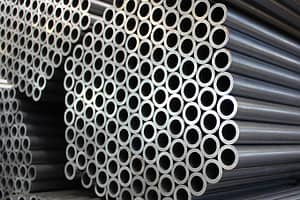+91-79045 61980 | Located in Chennai, TN
Properties of Seamless Hydraulic Pipes and Tubes
Chemical Properties :
Properties of Hydraulic Pipes as per DIN 2391 / C
Chemical Properties of Hydraulic Pipes | ||||||||
C | Si | Mn | P | S | Ni | Cr | Mo | Others |
ST 35 | 0.17 Max | 0.35 Max | 0.40 Max | 0.050 Max | 0.050 Max | – | – |
|
ST 45 | 0.21 Max | 0.35 Max | 0.40 Max | 0.050 Max | 0.050 Max | – | – |
|
ST 52 | 0.22 Max | 0.55 Max | 1.60 Max | 0.050 Max | 0.050 Max | – | – |
|
Physical Properties :
Hydraulic pipes are tubes that are used in hydraulic systems to transmit fluids under high pressure. Some of the special physical properties that may be important for hydraulic pipes include:
Dimensional accuracy:
This is one of the most important Properties of Seamless Hydraulic pipes and Tubes. The hydraulic pipe must have a consistent and precise diameter and wall thickness to ensure a proper fit within the system and to minimize pressure losses.
Mechanical strength:
This is another important Properties of Seamless Hydraulic pipes and Tubes. The hydraulic tube must be able to withstand the high pressures and forces that are present in a hydraulic system. To meet this requirement, hydraulic pipes are typically made from materials with high tensile strength, such as carbon steel or alloy steel.
Resistance to corrosion:
This is the third of the Important Properties of Seamless Hydraulic pipes and Tubes. The hydraulic tubes and pipes may come into contact with corrosive fluids or operate in harsh environments, so they must be resistant to corrosion to ensure long-lasting performance.
Resistance to temperature:
Some hydraulic systems may operate at high temperatures, so the pipes must be able to withstand these temperatures without failing. To meet this requirement, hydraulic pipes may be made from materials such as high-temperature alloys.
Wear resistance:
In systems that involve high-frequency cycling, the tubes may be subject to wear and tear. To ensure long-lasting performance, hydraulic tubes may be made from wear-resistant alloys.
Compatibility with fluids:
Another of the important Properties of Seamless Hydraulic Pipes and Tubes. The material used to make the hydraulic tubes should be compatible with the fluids being transmitted. For example, if the fluid is highly acidic or alkaline, the tubes should be made from a material that is resistant to corrosion by these substances.
Overall, the physical properties of hydraulic pipes must be carefully considered to ensure that they can withstand the demanding conditions of a hydraulic system and provide reliable and long-lasting performance.

